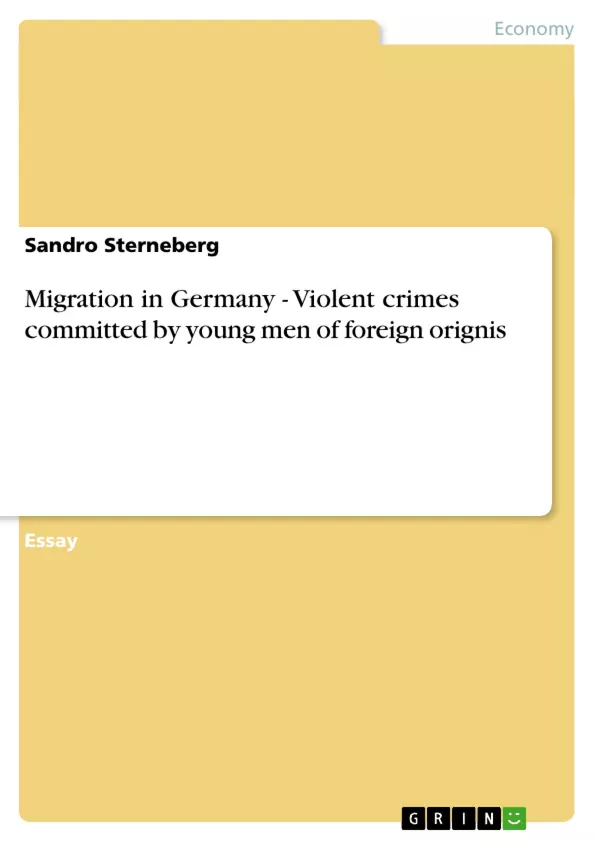In the 1960s the Federal Republic of Germany signed contracts with Turkey and other countries to send workers, mostly from rural areas, to support the booming industrial economy (The German Economic Miracle). [...] Nowadays Germany is a country of immigration which faces the challenges but also chances of a multicultural society. Unfortunately many foreign families are dependent on public transfer payments and therefore live in poor social and economical situations. People who are living under difficult conditions with no prospect for a positive change are likely to become criminals. Especially male teenagers and young men with migrant backgrounds (between 14-25 years) are in larger German cities more likely to be intensive culprits and commit crime.Therefore juvenile delinquency is an important issue for Germany which has been discussed in the public dispute for many years. The scandal about the “Rütli-Hauptschule” in Berlin (2006), where tutors refused to give lessons because they felt threatened by pupils, was probably just the tip of the iceberg but led together with other scandals again to a debate to find solutions for this problem. During the election campaign in the Bundesland (Federal State) Hessen Roland Koch, politician of the German Christian Democratic Party, named a resolution. He proposed that young criminals, so particularly young males with migrant backgrounds, should be more severe punished. Although it perhaps was a statement to catch votes during the election campaign even so it could be a solution for the problem. But is this the only and above all the best solution? The author of this essay has been following the discussion and was beside a solution interested in having a look behind the various reasons for their bearing to get committed to crimes. For that Berlin, the capital of Germany, was a very good example because it is one of the most cultural diverse cities in Germany and has got a high crime rate among young males with foreign origins. In addition the “Landes-kommission Berlin gegen Gewalt” assigned between 2005 and 2007 a task force consisting of scientists, members of the police, public
services and representatives of migrant organizations to examine the issue in detail as well as to work out recommendations for a possible solution. The aim of this essay is to state reasons for their behavior and to compare the suggestion by Roland Koch with the suggestions of the task force for an improvement in the situation.
Inhaltsverzeichnis (Table of Contents)
- Violent crimes committed by young men of foreign origins...
- Reasons for violent behavior by young men of foreign origins
- Recommendations for an improvement in the situation…………………...
- A process of rethinking instead of more severe punishment
Zielsetzung und Themenschwerpunkte (Objectives and Key Themes)
This essay aims to explore the reasons behind violent crimes committed by young men with foreign origins in Germany, focusing on the specific case of Berlin. The essay will then analyze the proposed solution of stricter punishment and compare it with recommendations put forth by the "Landeskommission Berlin gegen Gewalt."- The prevalence of violent crimes among young men with migrant backgrounds in Germany
- The cultural, social, and economic factors that contribute to this phenomenon
- The limitations of stricter punishment as a solution
- Alternative solutions for addressing the issue of youth violence
- The role of integration and social inclusion in preventing youth crime
Zusammenfassung der Kapitel (Chapter Summaries)
Violent crimes committed by young men of foreign origins
This chapter introduces the historical context of labor migration in Germany and how the influx of "Gastarbeiter" (guest workers) from Turkey and other countries has contributed to the present-day issue of youth violence. It highlights the socioeconomic challenges faced by many immigrant families, particularly their difficulties in securing stable employment due to low-skilled backgrounds and language barriers.Reasons for violent behavior by young men of foreign origins
This chapter delves into the potential factors contributing to violent behavior among young men with migrant backgrounds. It explores the influence of traditional cultural and religious expectations on male identity, as well as the role of puberty and the tendency for young men to express dominance through physical means. The chapter also examines the impact of social and economic factors, including unemployment, poverty, language barriers, and structural discrimination in education and employment.Schlüsselwörter (Keywords)
The essay centers around the key themes of youth violence, migration, integration, social structures, cultural factors, economic factors, and the social and political consequences of a multicultural society. Important concepts include the role of family, gender roles, the impact of traditional cultural norms, and the challenges of social inclusion in a complex, increasingly diverse society.Frequently Asked Questions
What is the main focus of this essay?
The essay explores the reasons behind violent crimes committed by young men of foreign origin in Germany, using Berlin as a primary example.
How did labor migration contribute to the current situation?
The "Gastarbeiter" (guest worker) programs of the 1960s brought many families to Germany who now face socio-economic challenges, which can sometimes lead to criminal behavior in younger generations.
What are the socio-economic reasons for youth violence?
Factors include poverty, dependence on public transfer payments, lack of prospects for change, language barriers, and structural discrimination in education and employment.
What was the "Rütli-Hauptschule" scandal?
In 2006, teachers at this Berlin school refused to teach because they felt threatened by pupils, sparking a national debate on integration and youth violence.
What solutions are discussed in the essay?
The essay compares Roland Koch's proposal for more severe punishment with the recommendations of the "Landeskommission Berlin gegen Gewalt," which emphasizes social inclusion and rethinking integration policies.
Does culture play a role in violent behavior?
The chapter on reasons for violence examines the influence of traditional cultural and religious expectations on male identity and dominance.
- Quote paper
- Sandro Sterneberg (Author), 2008, Migration in Germany - Violent crimes committed by young men of foreign orignis , Munich, GRIN Verlag, https://www.grin.com/document/137331



